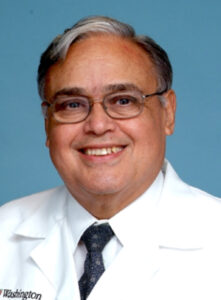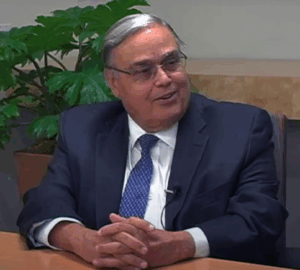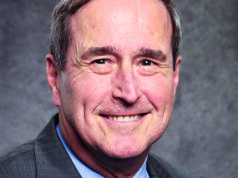
Gregorio A. Sicard, MD, a transformative figure in vascular surgery and a revered mentor to generations of surgeons, has died. He was 81.
Sicard was widely recognized for pioneering contributions to the field, particularly in developing and advocating for endovascular procedures. His career spanned more than four decades, during which he helped shape the vascular surgical specialty through clinical innovation, leadership and advocacy.
In 2018, Sicard was honored with the Lifetime Achievement Award by the Society for Vascular Surgery (SVS), the highest distinction bestowed by the SVS. He was celebrated as a “surgeon’s surgeon,” a title that reflected both his technical excellence and his unwavering commitment to advancing the specialty during the rise of minimally invasive techniques.
With his guidance and in close collaboration with Diego Fajardo, MD, Asovascular, the Colombian Association of Vascular Surgery and Angiology, was officially integrated with the SVS in 2010, establishing the Colombian Chapter—the second-oldest international chapter of the organization.
“Dr. Sicard was the strongest academic support we had,” said Fajardo. “There is an important aspect to consider for us Latin Americans, that obtaining an education from a reputable institution is not as easy. Having Dr. Sicard assist Dr. Juan Barrera, one of our previous presidents, who received a research scholarship through him, helped us merge opportunities to gain education from the SVS, which is very important to us. It meant transparency and respect.
“Dr. Sicard was a mentor who helped grow Latin American education and strengthen relationships with the SVS and the Colombian Association. As a friend and someone who was genuinely interested in advancing education, he helped other doctors from Colombia pursue opportunities at his work in Washington University. He was open to sharing his teaching capabilities, which is something you don’t find every day. He was someone we could trust to build bridges and represent us outside of the U.S.”

Sicard spent nearly his entire surgical career at Washington University School of Medicine in St. Louis, where he completed his residency and fellowship before joining the faculty. In 1983, he founded the Section of Vascular Surgery and, two years later, he received a promotion to professor of surgery. In 1998, he assumed the role of chief of the Division of General Surgery, which included vascular surgery. In 2006, he was named the Eugene M. Bricker Professor of Surgery.
His legacy at Washington University was further cemented in 2011, when the Gregorio A. Sicard Professorship was established in his honor.
Luis Sanchez, MD, FACS, the current Gregorio A. Sicard distinguished professor of surgery and radiology at Washington University, recognizes Sicard as a master of vascular surgery and a professor of countless generations of general and vascular surgeons.
“He was a vascular surgery regional, national and international leader that will always be remembered with special affection for his generosity sharing his extensive knowledge and expertise in vascular surgery,” said Sanchez. “His vision of the future of our field, his contagious laugh, his eternal positive attitude, and his active involvement in the education of medical students, trainees and colleagues alike… I was fortunate to closely work with him for over 20 years and follow him as the chief of vascular surgery at Washington University School of Medicine and Barnes Jewish Hospital, as well as carry the professorship that bears his name since 2011. He is a tremendous loss to our vascular surgery community and he will be greatly missed.”
As SVS president (2004–05), Sicard played a pivotal role in the merger of the SVS and the American Association for Vascular Surgery (AAVS), helping unify the specialty during a critical period of consolidation. He later chaired the SVS Outcomes Committee, working closely with the Food and Drug Administration (FDA) and Centers for Medicare & Medicaid Services (CMS) to advocate for evidence-based, patient-centered policies that recognized the essential role of vascular surgeons in endovascular care.
Born and raised in rural Puerto Rico, Sicard was the son of a surgeon and earned his medical degree from the University of Puerto Rico. He graduated in 1972 and went on to mentor more than 50 fellows, publish hundreds of articles and book chapters, and shape the careers of countless vascular surgeons around the world.
Sicard’s legacy lives on in the surgeons he trained, the patients he cared for and the field he helped shape. The vascular community will remember his surgical brilliance as well as his humility, generosity and enduring dedication to vascular surgery.











